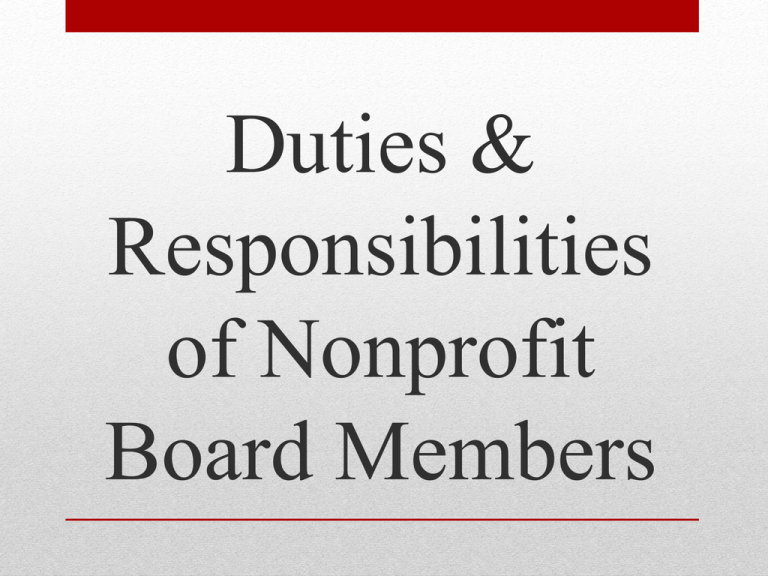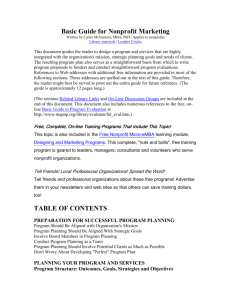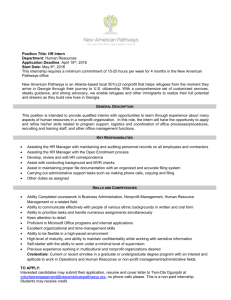Duties & Responsibilities - Lamar County Crime Stoppers
advertisement

Duties & Responsibilities of Nonprofit Board Members • SIDEBAR with the Judge • by Judge Richard W. Carter, Retired CSUSA Director of Legal Services • “Anonymity” Is Beyond “Important” • From the CSUSA web inquiries: “Is it a national policy to ask a tipster if they wish to remain anonymous before taking the tip? And if the tipster does not require anonymity, do we not take his tip and inform the tipster to call the police? • My response: “Crime Stoppers in an ANONYMOUS tip program. Tipsters should NOT be asked whether they wish to remain anonymous. It should be assumed that they do. To ask every tipster if they want to remain anonymous gives Crime Stoppers the appearance of being deceptive and running a bait and switch scheme.” • BUSINESS ORGANIZATIONS CODE • CHAPTER 22. NONPROFIT CORPORATIONS GENERAL STANDARDS FOR DIRECTORS & OFFICERS. • A director-officer is not liable to the corporation, a member, or another person for an action taken or not taken as a director if the director acted in, • in good faith; • with ordinary care; and • in a manner the director reasonably believed to be in the best interest of the corporation. • This section shall not affect the liability of the corporation for an act or omission of the officer. • To meet this requirement, directors must follow certain legal responsibilities also known as: • The Duty of Obedience • The Duty of Care • The Duty of Loyalty • The Duty of Obedience • Act in a manner that is consistent with: • • • • • • Certificate of Formation Articles of Incorporation Mission Bylaws Tax exempt status Federal, state, & local laws as they apply • The Duty of Obedience • If an action is not allowed by: • • • • • • Certificate of Formation Articles of Incorporation Mission Bylaws Tax exempt status Federal, state, & local laws • It should not be undertaken, even if it has good intentions. In most cases it is not worth the adverse results. • The Duty of Obedience • Crime Stoppers organizations need to follow “best practices”. • Shouldn’t a Crime Stopper program be “squeakily clean”? • If it is not allowed, don’t do it. • Don’t break the law Duty of Obedience • The Duty of Care • Perform duties with “ordinary care”, which is good judgement and common sense. • Devote reasonable time & attention to duties • Attend meetings • Review & understand material given • Ask questions, if necessary. • Ordinary care may differ from director to director based on their background, experience, and the role they play in the organization. • The Duty of Care • A director acts in the best interest of the nonprofit if the director reasonably believes that the action will benefit the nonprofit. • The director should have a proper motive based on sufficient information. • The Duty of Loyalty • Law requires that the best interest of the nonprofit prevail over the director’s personal or business interests. • Conflicts of Interest • Business • Financial • Decisions should not benefit: • You • Your family • Your business interest At the expense of the nonprofit • Conflicts of Interest • Contracts & Transactions between director & nonprofit are prohibited by law unless: • Facts are disclosed to board • Specifically approved by board in good faith & ordinary care by a vote of disinterested directors • Vote can be less than a quorum • Transaction with director should be carefully documented in the minutes • Liability • Directors may not allow the distribution of assets if a nonprofit is insolvent or the distribution would make it insolvent, unless the nonprofit is paying a debt. • If directors violate this rule, they can be personally responsible for the value of the unpaid debts of the nonprofit. • A director is presumed to have assented to the distribution unless their dissent is appropriately entered into the minutes of the meeting • Directors may be protected if they acted in good faith and relied on the written opinion of an attorney for the nonprofit • Taxes






